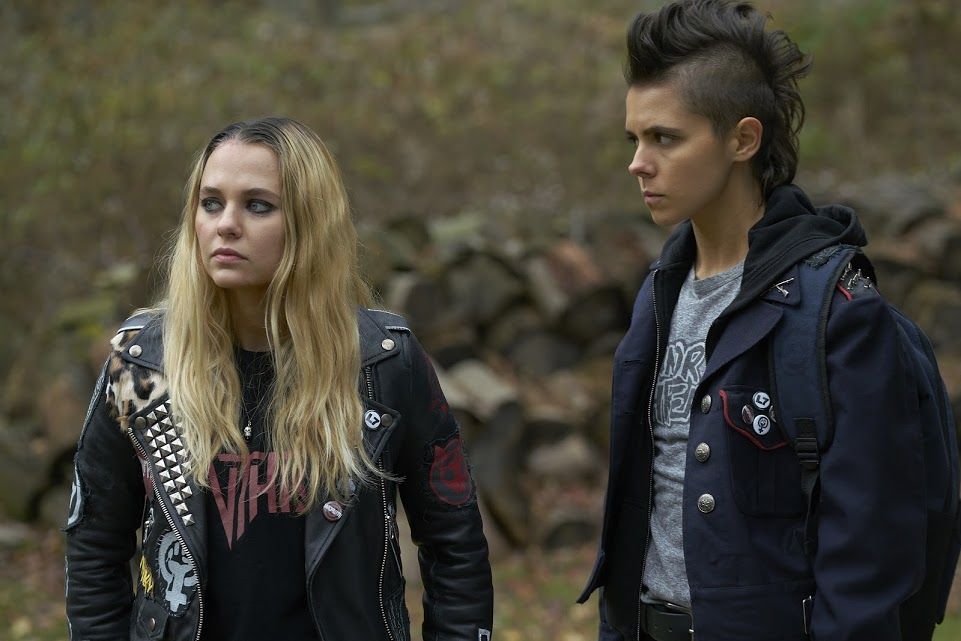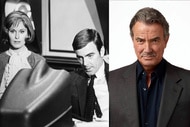Create a free profile to get unlimited access to exclusive videos, sweepstakes, and more!
Riot Girls director Jovanka Vuckovic talks representation and revolt

Jovanka Vuckovic is living the FANGRRL's dream. She grew up watching weird and wonderful genre movies. Now, with the post-apocalyptic fantasy Riot Girls, she's making her own, and using them to chisel a space for girls like her and all the other misfits who, for too long, have felt excluded from the genres they love.
Riot Girls follows eponymous heroines Nat (Madison Iseman) and Scratch (Paloma Kwiatkowski) as they find trouble and love in a teenage wasteland. In the small town of Potter's Bluff, all the grown-ups are dead, killed off by a gut-busting plague. With the surviving teens in charge, the town has been severed into two warring factions. On the wealthy West Side, the high school has become a fortress where varsity-jacket-wearing jocks reign, enforcing conformity and a deadly jingoism. On the East Side, the poor kids scrape by as a family, under the gentle guidance of Nat's older brother Jack (Alexandre Bourgeois). But once he's kidnapped by the West Side's ruthless tyrant Jeremy (Munro Chambers), it's up to her and her girlfriend Scratch to rescue Jack before it's too late.
Ahead of the film's North American premiere at Fantasia International Film Festival, SYFY FANGRRLS sat down with the Riot Girls director, who shared with us her path to making a proudly queer coming-of-age drama at the edge of the apocalypse.
"It took me 10 years to get my first feature made," Vuckovic began. "And I think that that's pretty average. When you ask other filmmakers, they usually say from the day that you decide that you're going to make films, it'll take you 10 years. At least, that's what everyone says. I mean, I'm sure there are these outliers that luck out and upload one movie to YouTube and then they're hired to make the next Star Wars film or whatever, but that doesn't happen to women."
Vuckovic should know. Before she began making her own genre films, she covered them as the editor of Rue Morgue Magazine. In her work there over six and a half years, she grew increasingly frustrated by the lack of female representation in filmmaking. "One of the reasons why I quit magazines and started making films," she said, "was because I was asking all of my male filmmaker friends to depict women as people in horror films. And I got tired of asking them. I decided I was just going to do it myself. So my career goal is to redefine women in the genre space."
Encouraged by her filmmaker friends, Vuckovic began making her own horror shorts. This included "The Box," a terrifically terrifying segment of XX, a horror anthology film written and directed by female filmmakers. "My plan was to write and direct all my own material," Vuckovic said. "And it was all going to be horror, and it was all going to be about women with adult problems." She chuckled, "I said I was never going to make a movie about teenagers, and here I am."
So how did Vuckovic come to helm Katherine Collins' script for Riot Girls? "Life is full of surprises," she said. "Katherine's script just surprised me because it's not that often that I see films that have queer characters that aren't about being queer. What I loved about it was, it was just a regular cult film: A teen apocalypse movie with kids killing each other, and the queerness of the leads was just very matter-of-fact. It's just who they are. And representation matters. So yeah, that's how I found my way into the story."
Of Riot Girls' queer and punk heroines, she said, "These kinds of characters did not exist when I was growing up. When I was a weirdo teen that was trying to find my place in a world that felt like it didn't want me, movies weren't helping, because like we're all about guys. And there was nobody like me on the screen." She and Collins connected over this desire to make a space for girls like them in cult movies they clung to in their youth. Vuckovic added, "Like, I would have never done it if it was a Romeo and Juliet story. I did it because it was a Juliet and Juliet story, and I think the world needs more of that kind of wish fulfillment."
But not everyone was sold on Riot Girls. Throughout development, the filmmaking team was repeatedly questioned whether there was an audience for this story. "Even now I'm still battling that," she admitted. "The producer, Lauren [Grant], and I are still battling the 'Who is this for?' question. Which is crazy given the popularity of queer television." She suggested this is because of a "blind spot" that comes from film and television catering so often and so doggedly to straight white male audiences. That's not the audience this movie is made for. "[Riot Girls] isn't about a male who goes and rescues a girl. So their biggest note is always like, 'We don't understand why Jack gets captured and then he just kind of exists to be rescued.' And I was like, 'Hmm, funny how that is, eh? It's kind of how women have been depicted in these kinds of movies for the last hundred years or so.'"
Without naming names, Vuckovic shared that some male producers who were developing Riot Girls early on were pushing Collins to make her script be "like The Hunger Games with sexy lesbians, lots of sexy lesbians scenes," while another female character "basically existed to get fucked by Jack." In Vuckovic's pitch, which secured her Riot Girls' helm, she expressed a vision that moved away from the male gaze pressures of those producers who saw the female characters chiefly as sex objects. "When you're a woman and you see this [objectification], it just sticks out and you immediately just start carving it out," she explained. "All of the things that we've all collectively been complaining about for years about women's representation in cinema is the easiest stuff to remove."
From there, Vuckovic, Collins and Grant were all on the same page, reshaping the script to better speak to their experience and interests. "The conversation was really easy," she recalled. "It was like, 'Hey this feels very much like Tank Girl. What do you think about setting it in the '90s with a whole bunch of cool riot grrrl-era music, punk and heavy metal, and make these girls like real people? And overwhelmingly the collective answer was yes. That's the movie that we want to make."
Vuckovic's dedication to representation goes beyond the onscreen depiction of her movies' heroines. "We prioritized diversity behind the camera and in front of it," she said. "This stuff was important." Its cast is inclusive, featuring actors of color like Ajay Friese, Robyn Alomar, Jordana Blake, Jenny Raven, and Vinson Tran. And behind the scenes, Vuckovic and Grant were committed to hiring women for her crew, wherever they could. "That made the movie uniquely challenging," she admitted. "Because instead of just kind of just hiring a bunch of men who have all of the experience and all of the opportunities, we had to take chances in hiring lesser experienced women in some roles. And I had to work with a group of strangers."
Hiring greener crewmembers was a risk and a challenge, but to Vuckovic, it was essential. "If I didn't do that, I wouldn't sleep at night," she said, "I wouldn't have met all these amazingly capable women, and absolutely zero change would happen."
In the end, Vuckovic made her feature directorial debut more than a movie. She took her inspiration of representation beyond a personal place and beyond the genre space. By casting inclusively and making it a point to hire women on her crew, she provided opportunities to groups callously overlooked by the blindspot-having Boys Club of filmmaking. And through all this, she made Riot Girls more than a movie; she made it part of a revolution.
Following its Fantasia bow, Riot Girls hits select theaters and On Demand on September 13.














